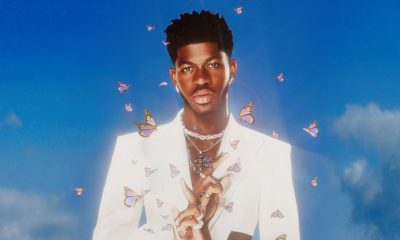Arts & Entertainment
Calendar: March 30
Concerts, exhibits, parties and more through April 5
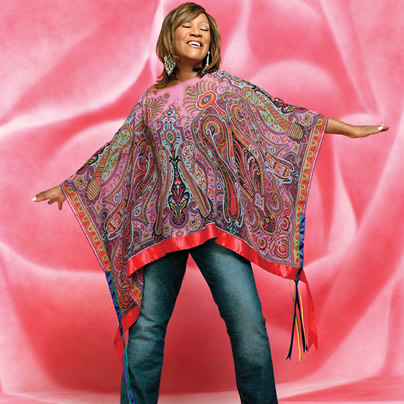
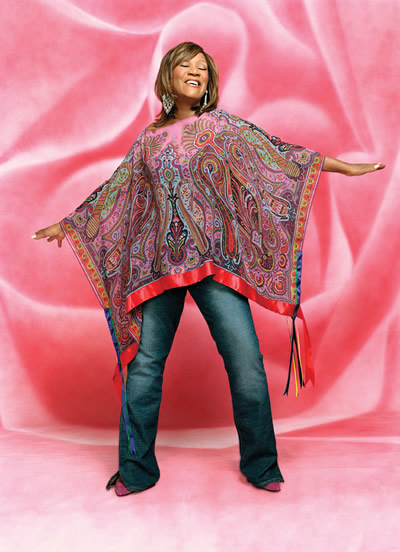
PATTI LABELLE plays the Music Center at Strathmore with back-to-back performances tonight and Saturday. (Photo courtesy Strathmore)
TODAY (Friday)
Potomac Productions presents “Lynda Carter: Body & Soul” tonight at the Kennedy Center (2700 F St., N.W.) at 7:30 p.m. Tickets range from $30 to $65 and can be purchased online at kennedy-center.org. Carter, most famous for playing “Wonder Woman” in the ‘70s, has reignited her singing career in recent years.
Jen Urban and the Box with Frankie and Betty play Phase 1 (525 8th St., S.E.) tonight at 9 p.m. There is a $10 cover and all attendees must be 21 or older.
The HIV Working Group will be doing outreach tonight at Town (2009 8th St., N.W.) during Bear Happy Hour starting at 7 p.m. and continuing throughout the night until midnight. Volunteers are needed. For more information, visit thedccenter.org.
Violent Vickie, Lazerbitch and Lost Bois play Comet Ping Pong (5037 Connecticut Ave., N.W.) tonight at 10 p.m. There is a $10 cover for this event.
Patti LaBelle plays the Music Center at Strathmore (5301 Tuckerman Lane, North Bethesda) tonight at 8 p.m. Tickets range from $35 to $120 and can be purchased online atstrathmore.org. She will also be performing Saturday at 8 p.m.
Shawn Colvin plays the Birchmere (3701 Mt. Vernon Ave., Alexandria) tonight at 7:30 p.m. with Carsie Blanton. Tickets are $45 and can be purchased online at ticketmaster.com.
Busboys & Poets will be hosting ASL open mic poetry tonight at 11 p.m. in the Langston Room at its 14th and V streets location (2021 14th St., N.W.). Anyone with sign language knowledge may sign up to recite a poem or sign a song by e-mailing [email protected]. There is a $5 cover.
Saturday, March 31
Wayne Brady joins the National Symphony Orchestra for “Wayne Brady Sings the Sammys,” tonight at the Kennedy Center (2700 F St., N.W.) at 8 p.m. Tickets range from $20 to $85 and can be purchased online at kennedy-center.org.
D.C. native comedian and Huffington Post writer Tom Rhodes will be at Riot Act Comedy Theater (801 E St., N.W.) tonight at 8 and 10:30 p.m. Tickets are $20 and available online at riotactcomedy.com.
Ensemble group Hot Club of San Francisco plays Wolf Trap (1645 Trap Rd., Vienna) tonight at 7:30 p.m. Tickets are $30 and available online at wolftrap.org.
The Lodge (21614 National Pike, Boonsboro) and Boyz Town present “Spring Fever: The Undies and Panties Party” tonight featuring the Hot Bod contest and beats by DJ Keith Hoffman. No cover before 10 p.m., $5 cover after.
Adventuring is having a hike at Little Devils Stairs and Piney Branch Loop today. The group is meeting at 8:30 a.m. in the Pentagon Reservation parking lot on Army Navy Drive, across from Macy’s in Pentagon City. Estimated costs are $15 for transportation, if not driving, $8 for park admission and the $2 trip fee. For more information, visit adventuring.org.
Sunday, April 1
Bruce Springsteen and the E Street Band play Verizon Center (601 F St., N.W.) tonight at 7:30 p.m. Tickets range from $68 to $98 and can be purchased online atticketmaster.com.
The Fridge (516 1/2 8th St., S.E.) presents “Dissociative” by graffiti artist Scotchopening today. There will be a stencil and spray paint class with the artist from 2 to 4 p.m. followed by an opening reception until 8 p.m.
Monday, April 2
Focus-In! Films presents “Howl” as its April Film of the Month and in celebration of National Poetry Month with a screening at Busboys & Poets’s Hyattsville location (5331 Baltimore Ave., Suite 104) tonight at 7 p.m. The film stars James Franco as a young Allen Ginsberg. This is a free screening.
Green Lantern (1335 Green Court, N.W.) hosts Bears Do Yoga this evening from 6:30 to 7:30 p.m. upstairs and karaoke hosted by Mike at 9:30.
Tuesday, April 3
The Chesapeake Squares, a gay square dancing group, are having a mainstream-through-advanced club night tonight at the Waxter Center (1000 Cathedral St.) in Baltimore from 8 to 10 p.m. For more information, visit chesapeakesquares.org.
Join Burgundy Crescent Volunteers to help pack safer sex kits from 7 to 9 p.m. tonight at FUK!T’s packing location, Green Lantern, 1335 Green Ct., N.W.
Wednesday, April 4
The D.C. Center (1318 U St., N.W.) is having a four-session course on financial planning for same sex couples starting today at 6 p.m. Material will include understanding investments, family protection building and more. To register for this free program, email[email protected].
Riot Act Comedy Theater’s (801 E St., N.W.) monthly gay and gay-friendly comedy show “Gay-larious” returns tonight at 8:30 p.m. with Frank Liotti, Jess Wood and co-founders Chris Doucette and Zach Toczynski. Tickets are $15 and can be purchased online at riotactcomedy.com.
Joan Osborne plays the Birchmere (3701 Mt. Vernon Ave., Alexandria) tonight with Lera Lynn. Tickets are $35 and can be purchased online at ticketmaster.com.
Thursday, April 5
The Transmen Discussion Group meets tonight at the D.C. Center (1318 U St., N.W.) from 6 to 7 p.m. in the conference room.
The Shondes with Troll Tax and Fell Types will play the Rock and Roll Hotel (1353 H St., N.E.) tonight at 8 p.m. Tickets are $10 and can be purchased online atrockandrollhoteldc.com.
Kevin Costner and his band Modern West play the Music Center at Strathmore (5301 Tuckerman Lane, North Besthesda) tonight at 8 p.m. Tickets range from $35 to $90 and can be purchased online at strathmore.org.
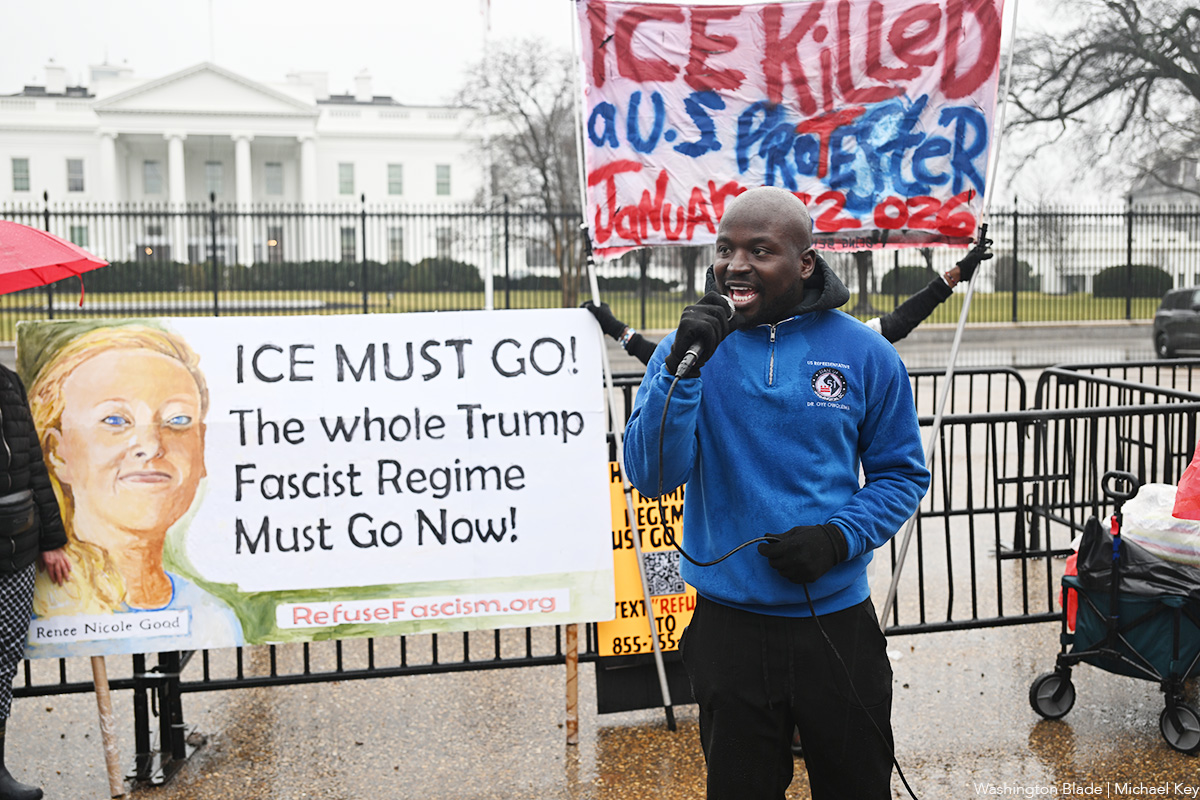
A protest was held outside of the White House on Saturday following the killing of Renee Nicole Good by a U.S. Immigration and Customs Enforcement agent in Minneapolis. Across the Potomac, picketers held signs calling for “Justice for Renee” in Tysons, Va.
Demonstrations were held in cities and towns across the country, according to multiple reports. A march was held yesterday in Washington, D.C., as the Blade reported. Further demonstrations are planned for tomorrow.
(Washington Blade photos by Michael Key)
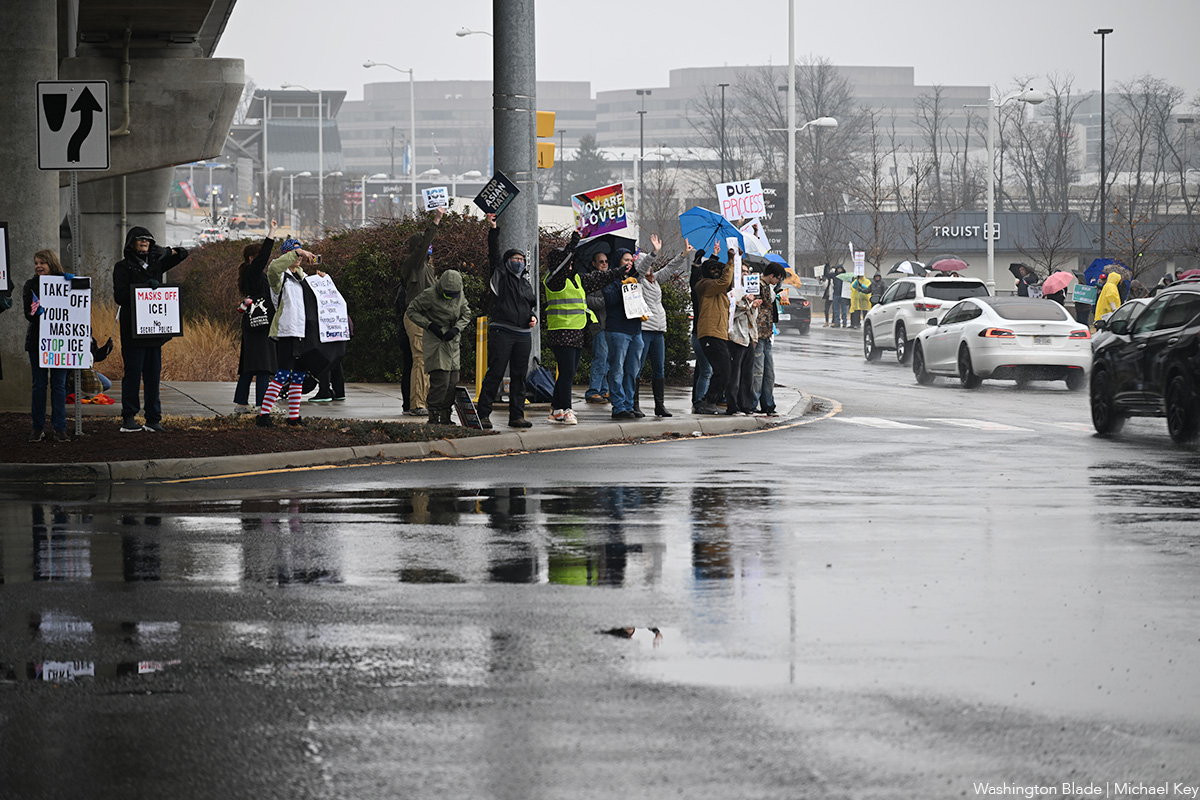
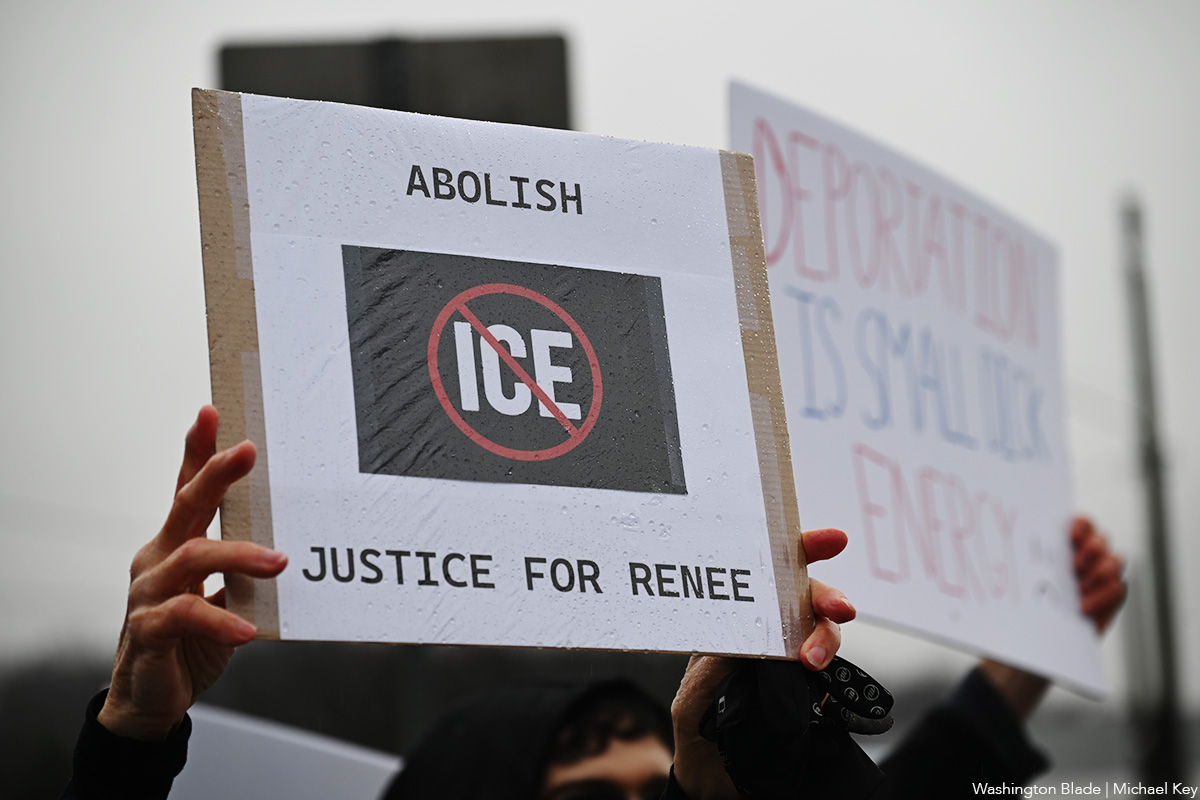
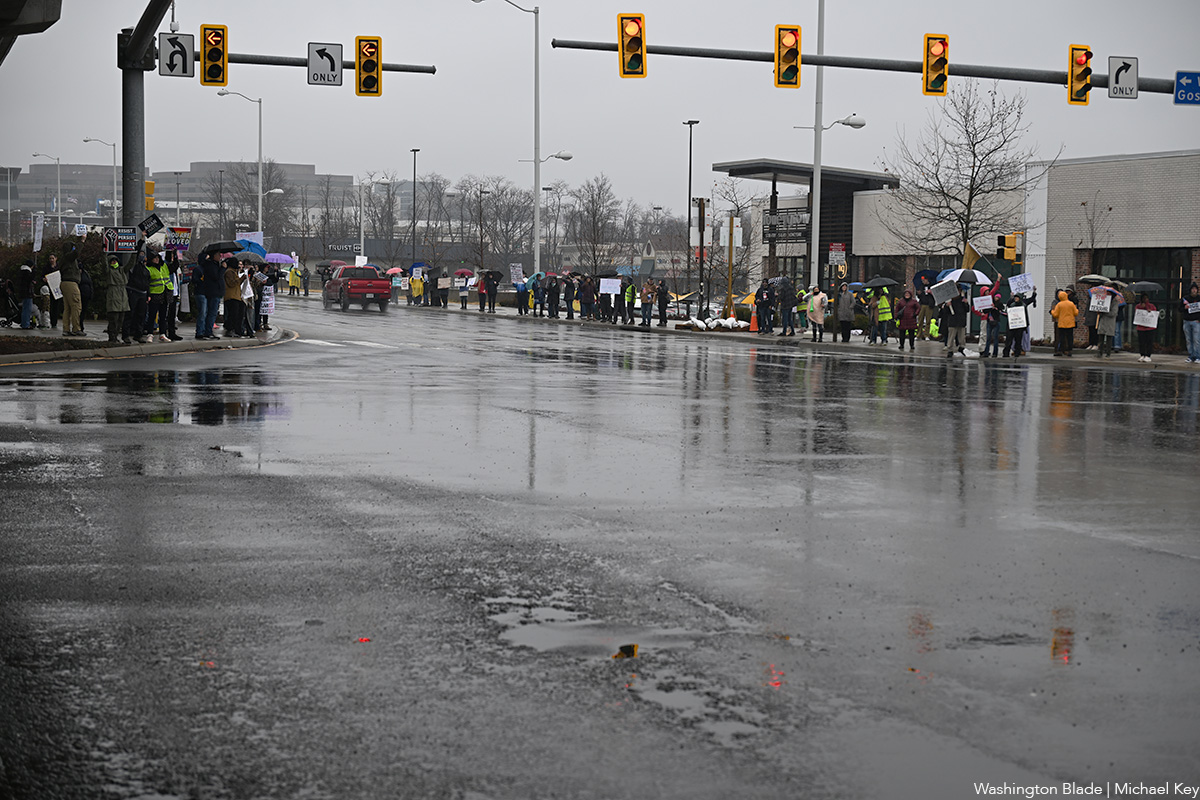
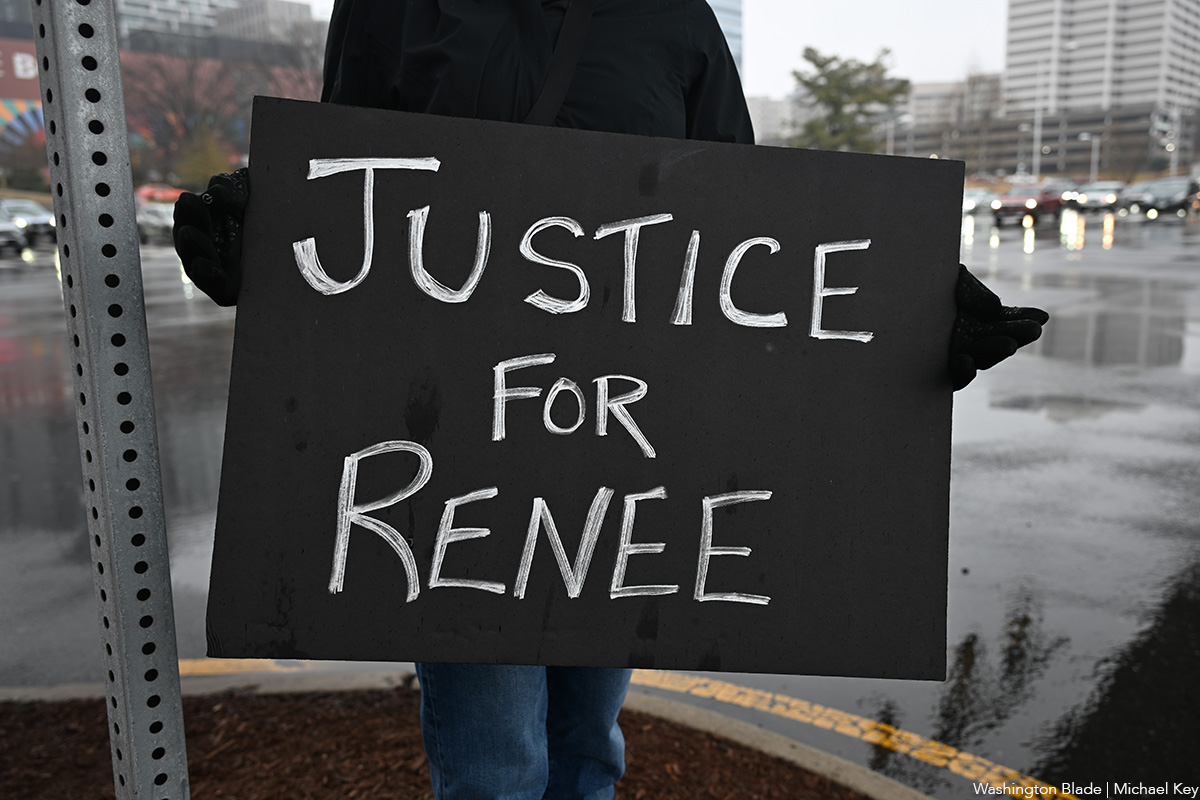
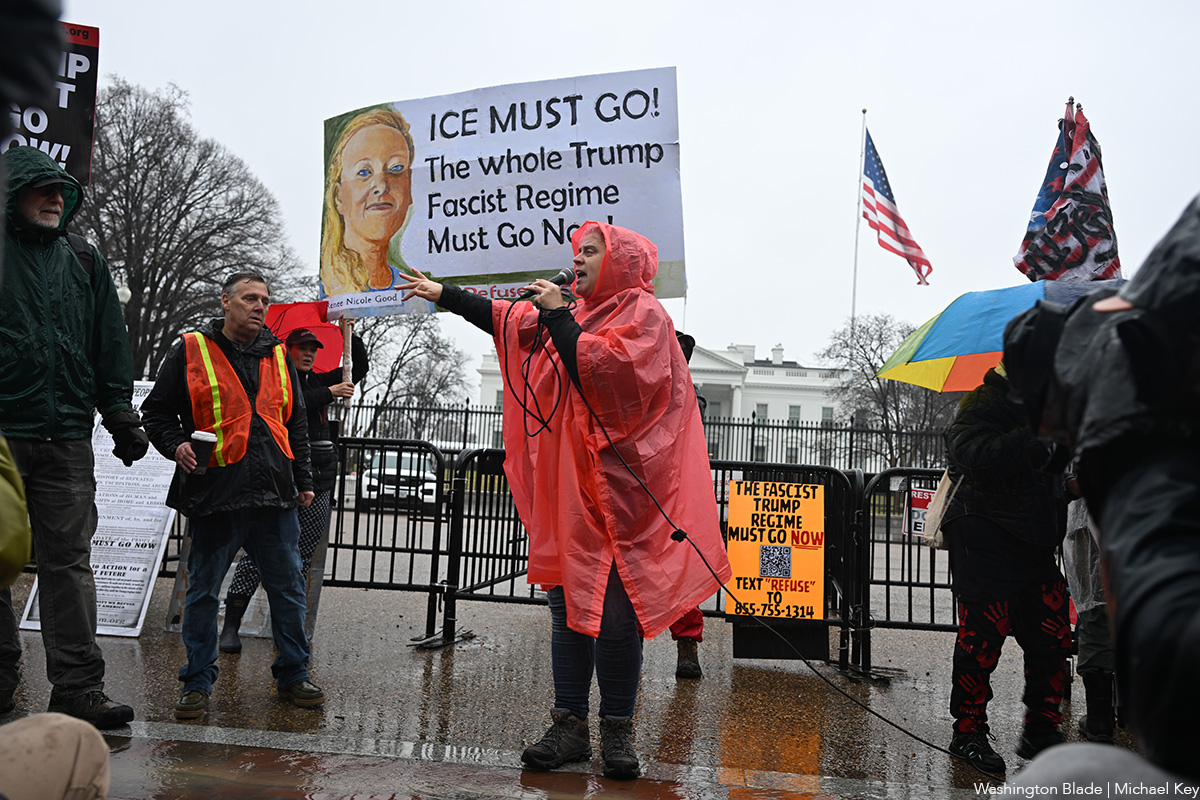
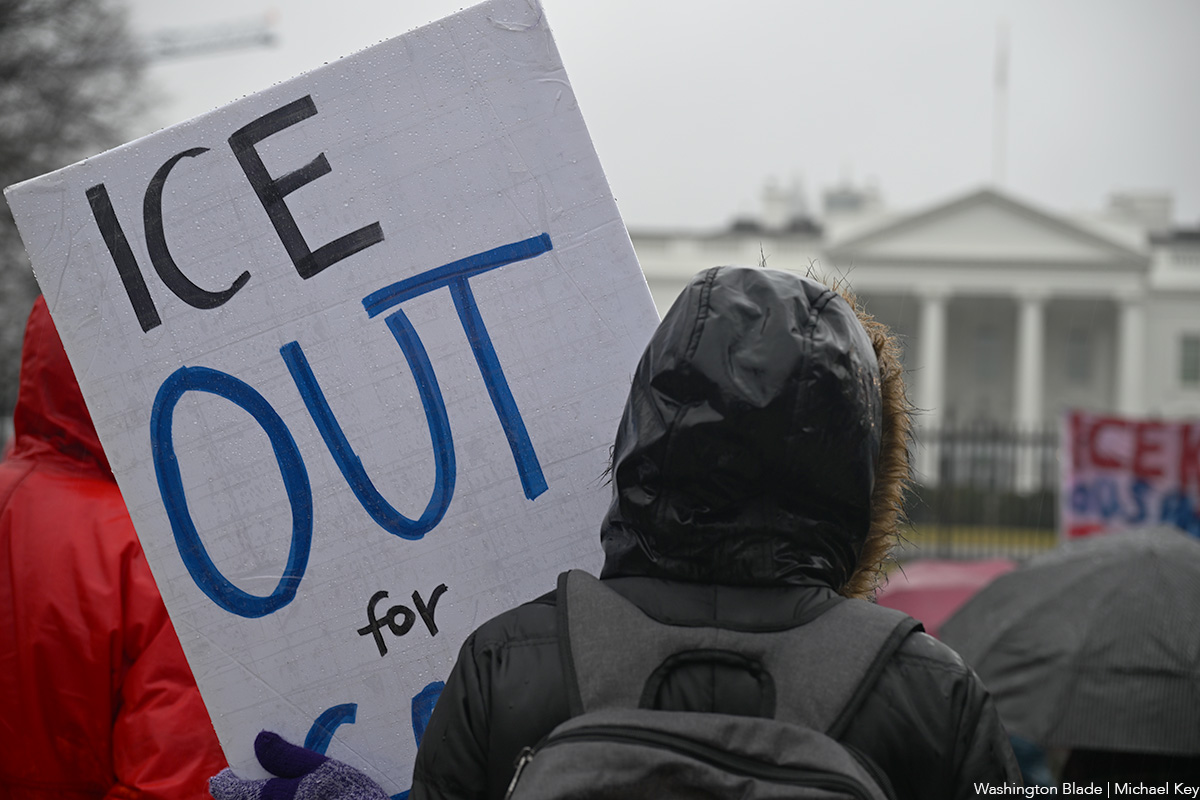
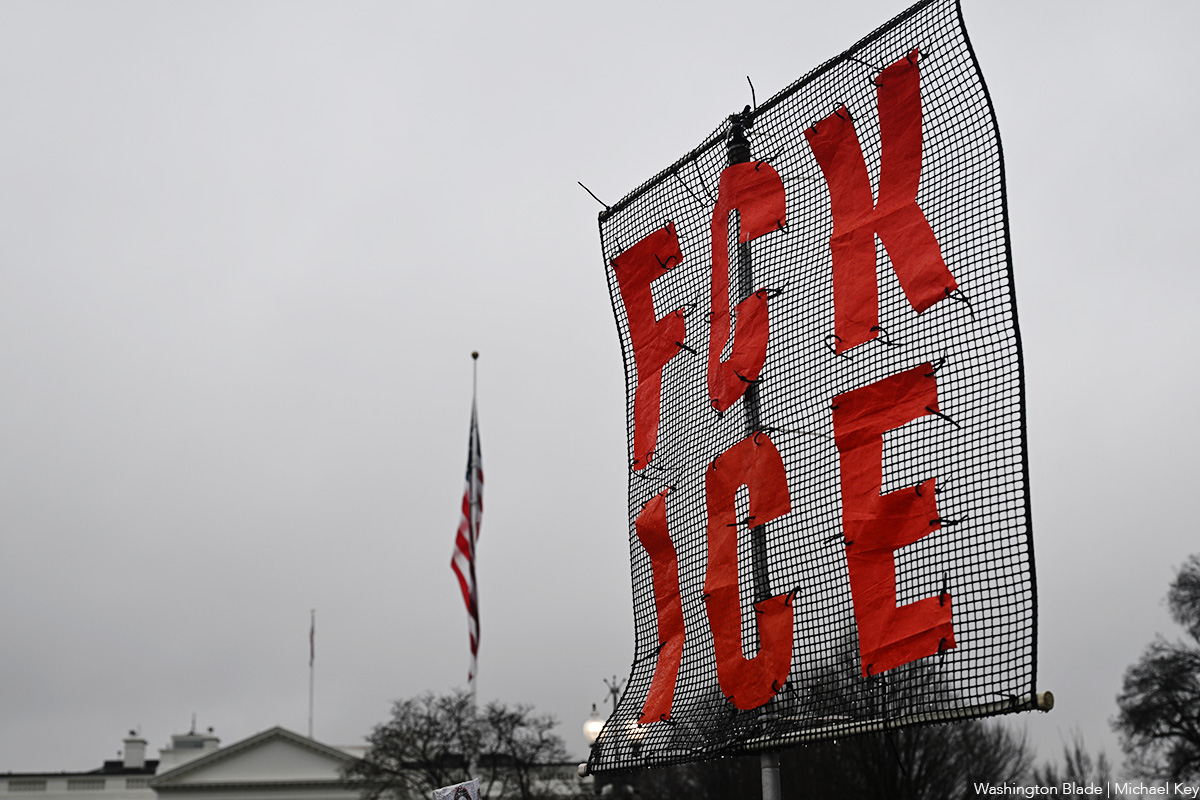
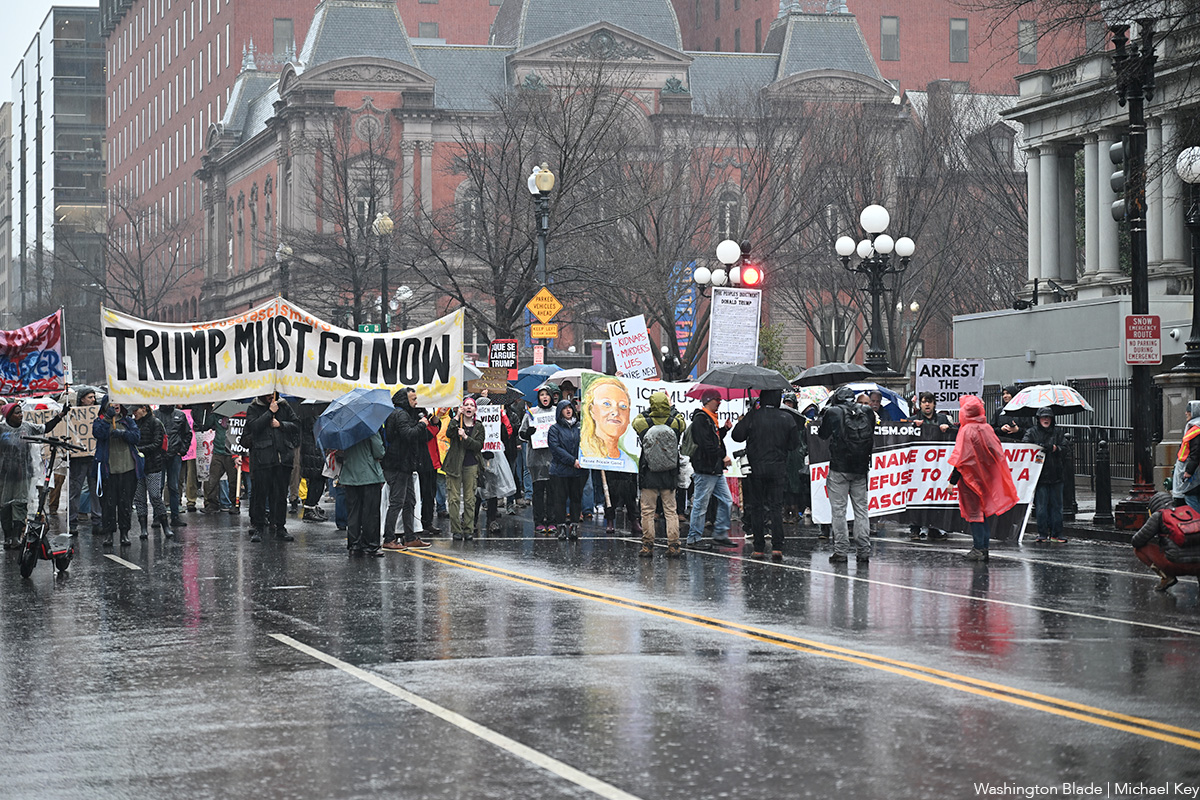

Books
Feminist fiction fans will love ‘Bog Queen’
A wonderful tale of druids, warriors, scheming kings, and a scientist
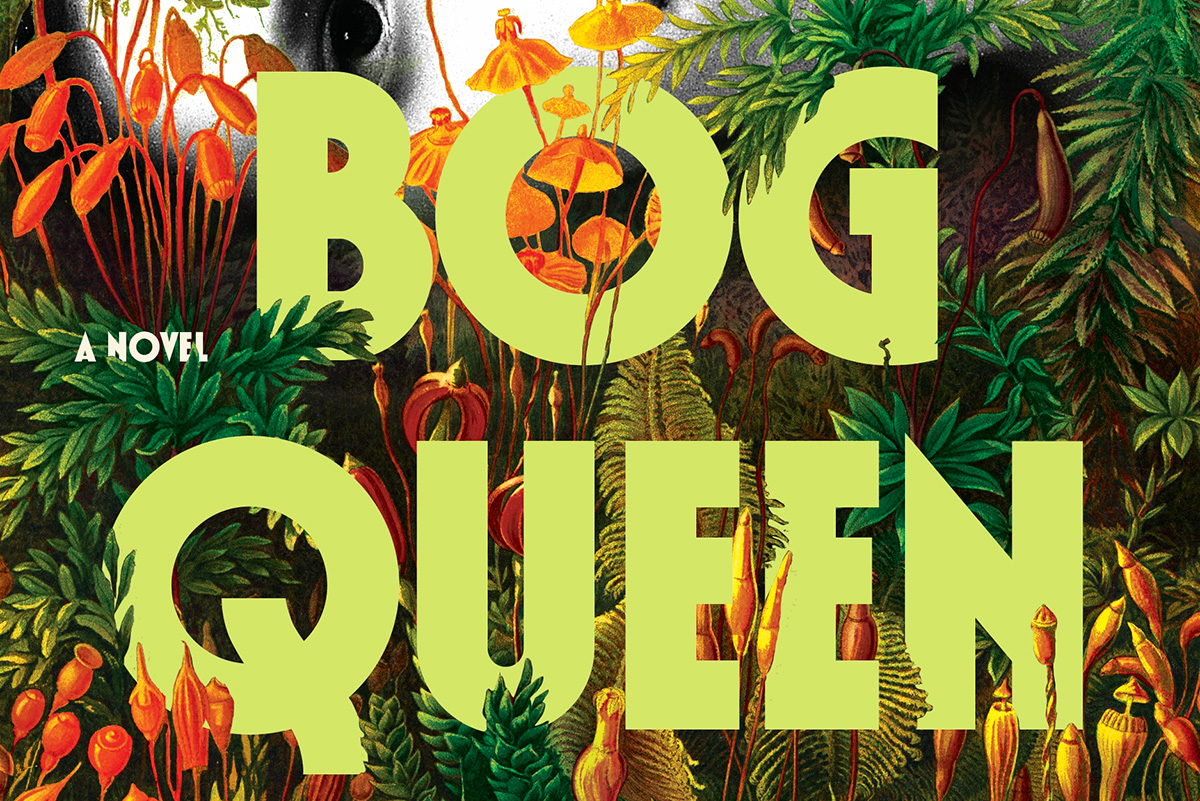
‘Bog Queen’
By Anna North
c.2025, Bloomsbury
$28.99/288 pages
Consider: lost and found.
The first one is miserable – whatever you need or want is gone, maybe for good. The second one can be joyful, a celebration of great relief and a reminder to look in the same spot next time you need that which you first lost. Loss hurts. But as in the new novel, “Bog Queen” by Anna North, discovery isn’t always without pain.

He’d always stuck to the story.
In 1961, or so he claimed, Isabel Navarro argued with her husband, as they had many times. At one point, she stalked out. Done. Gone, but there was always doubt – and now it seemed he’d been lying for decades: when peat cutters discovered the body of a young woman near his home in northwest England, Navarro finally admitted that he’d killed Isabel and dumped her corpse into a bog.
Officials prepared to charge him.
But again, that doubt. The body, as forensic anthropologist Agnes Lundstrom discovered rather quickly, was not that of Isabel. This bog woman had nearly healed wounds and her head showed old skull fractures. Her skin glowed yellow from decaying moss that her body had steeped in. No, the corpse in the bog was not from a half-century ago.
She was roughly 2,000 years old.
But who was the woman from the bog? Knowing more about her would’ve been a nice distraction for Agnes; she’d left America to move to England, left her father and a man she might have loved once, with the hope that her life could be different. She disliked solitude but she felt awkward around people, including the environmental activists, politicians, and others surrounding the discovery of the Iron Age corpse.
Was the woman beloved? Agnes could tell that she’d obviously been well cared-for, and relatively healthy despite the injuries she’d sustained. If there were any artifacts left in the bog, Agnes would have the answers she wanted. If only Isabel’s family, the activists, and authorities could come together and grant her more time.
Fortunately, that’s what you get inside “Bog Queen”: time, spanning from the Iron Age and the story of a young, inexperienced druid who’s hoping to forge ties with a southern kingdom; to 2018, the year in which the modern portion of this book is set.
Yes, you get both.
Yes, you’ll devour them.
Taking parts of a true story, author Anna North spins a wonderful tale of druids, vengeful warriors, scheming kings, and a scientist who’s as much of a genius as she is a nerd. The tale of the two women swings back and forth between chapters and eras, mixed with female strength and twenty-first century concerns. Even better, these perfectly mixed parts are occasionally joined by a third entity that adds a delicious note of darkness, as if whatever happens can be erased in a moment.
Nah, don’t even think about resisting.
If you’re a fan of feminist fiction, science, or novels featuring kings, druids, and Celtic history, don’t wait. “Bog Queen” is your book. Look. You’ll be glad you found it.
Movies
A Shakespearean tragedy comes to life in exquisite ‘Hamnet’
Chloe Zhao’s devastating movie a touchstone for the ages
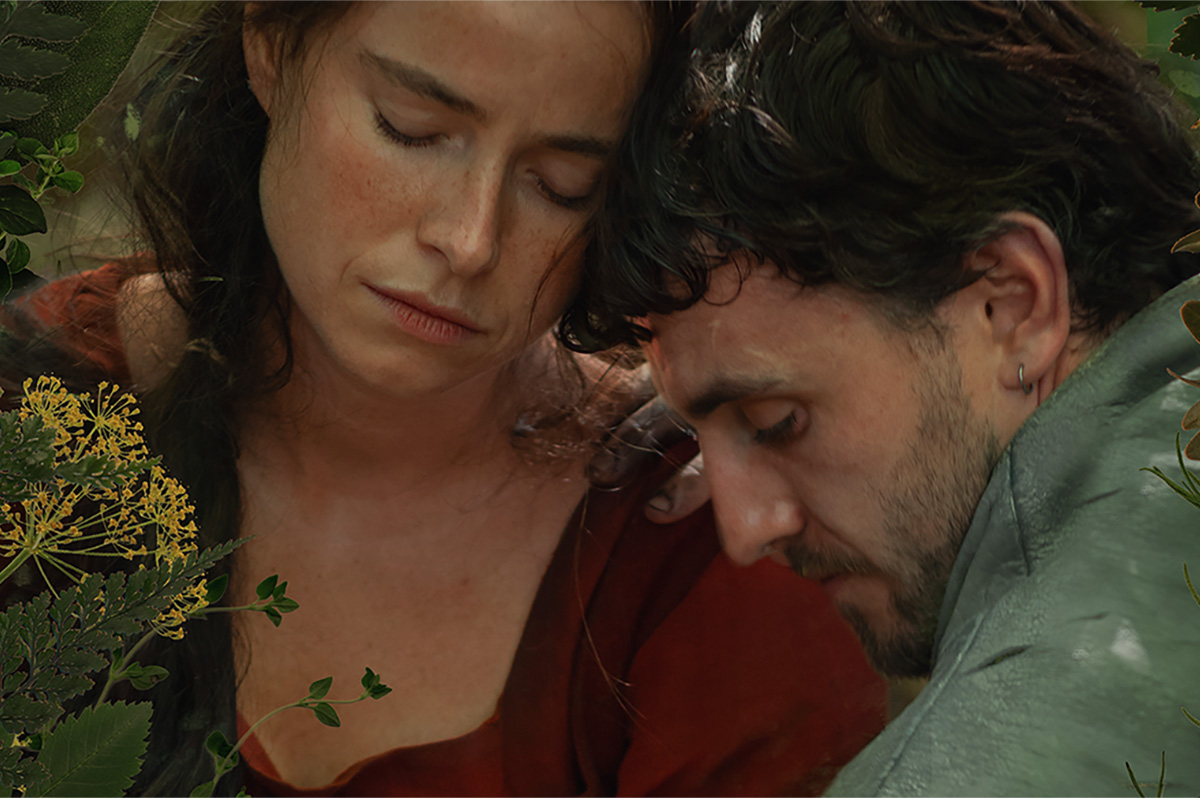
For every person who adores Shakespeare, there are probably a dozen more who wonder why.
We get it; his plays and poems, composed in a past when the predominant worldview was built around beliefs and ideologies that now feel as antiquated as the blend of poetry and prose in which he wrote them, can easily feel tied to social mores that are in direct opposition to our own, often reflecting the classist, sexist, and racist patriarchal dogma that continues to plague our world today. Why, then, should we still be so enthralled with him?
The answer to that question might be more eloquently expressed by Chloe Zhao’s “Hamnet” – now in wide release and already a winner in this year’s barely begun awards season – than through any explanation we could offer.
Adapted from the novel by Maggie O’Farrell (who co-wrote the screenplay with Zhao), it focuses its narrative on the relationship between Will Shakespeare (Paul Mescal) and his wife Agnes Hathaway (Jessie Buckley), who meet when the future playwright – working to pay off a debt for his abusive father – is still just a tutor helping the children of well-to-do families learn Latin. Enamored from afar at first sight, he woos his way into her life, and, convincing both of their families to approve the match (after she becomes pregnant with their first child), becomes her husband. More children follow – including Hamnet (Jacobi Jupe), a “surprise” twin boy to their second daughter – but, recognizing Will’s passion for writing and his frustration at being unable to follow it, Agnes encourages him to travel to London in order to immerse himself in his ambitions.
As the years go by, Agnes – aided by her mother-in-law (Emily Watson) and guided by the nature-centric pagan wisdom of her own deceased mother – raises the children while her husband, miles away, builds a successful career as the city’s most popular playwright. But when an outbreak of bubonic plague results in the death of 11-year-old Hamnet in Will’s absence, an emotional wedge is driven between them – especially when Agnes receives word that her husband’s latest play, titled “Hamlet,” an interchangeable equivalent to the name of their dead son, is about to debut on the London stage.
There is nothing, save the bare details of circumstance around the Shakespeare family, that can be called factual about the narrative told in “Hamnet.” Records of Shakespeare’s private life are sparse and short on context, largely limited to civic notations of fact – birth, marriage, and death announcements, legal documents, and other general records – that leave plenty of space in which to speculate about the personal nuance such mundane details might imply. What is known is that the Shakespeares lost their son, probably to plague, and that “Hamlet” – a play dominated by expressions of grief and existential musings about life and death – was written over the course of the next five years. Shakespearean scholars have filled in the blanks, and it’s hard to argue with their assumptions about the influence young Hamnet’s tragic death likely had over the creation of his father’s masterwork. What human being would not be haunted by such an event, and how could any artist could avoid channeling its impact into their work, not just for a time but for forever after?
In their screenplay, O’Farrell and Zhao imagine an Agnes Shakespeare (most records refer to her as “Anne” but her father’s will uses the name “Agnes”) who stands apart from the conventions of her town, born of a “wild woman” in the woods and raised in ancient traditions of mysticism and nature magic before being adopted into her well-off family, who presents a worthy match and an intellectual equal for the brilliantly passionate creator responsible for some of Western Civilization’s most enduring tales. They imagine a courtship that would have defied the customs of the time and a relationship that feels almost modern, grounded in a love and mutual respect that’s a far cry from most popular notions of what a 16th-century marriage might look like. More than that, they imagine that the devastating loss of a child – even in a time when the mortality rate for children was high – might create a rift between two parents who can only process their grief alone. And despite the fact that almost none of what O’Farrell and Zhao present to us can be seen, at best, as anything other than informed speculation, it all feels devastatingly true.
That’s the quality that “Hamnet” shares with the ever-popular Will Shakespeare; though it takes us into a past that feels as alien to us as if it took place upon a different planet, it evokes a connection to the simple experience of being human, which cuts through the differences in context. Just as the kings, heroes, and fools of Shakespeare’s plays express and embody the same emotional experiences that shape our own mundane modern lives, the film’s portrayal of these two real-life people torn apart by personal tragedy speaks directly to our own shared sense of loss – and it does so with an eloquence that, like Shakespeare’s, emerges from the story to make it feel as palpable as if their grief was our own.
Yes, the writing and direction – each bringing a powerfully feminine “voice” to the story – are key to the emotional impact of “Hamnet,” but it’s the performances of its stars that carry it to us. Mescal, once more proving himself a master at embodying the kind of vulnerable masculine tenderness that’s capable of melting our hearts, gives us an accessible Shakespeare, driven perhaps by a spark of genius yet deeply grounded in the tangible humanity that underscores the “everyman” sensibility that informs the man’s plays. But it’s Buckley’s movie, by a wide margin, and her bold, fierce, and deeply affecting performance gives voice to a powerful grief, a cry against the injustice and cruelty of what we fumblingly call “fate” that resonates deep within us and carries our own grief, over losses we’ve had and losses we know are yet to come, along with her on the journey to catharsis.
That’s the word – “catharsis” – that defines why Shakespeare (and by extension, “Hamnet”) still holds such power over the imagination of our human race all these centuries later. The circumstantial details of his stories, wrapped up in ancient ideologies that still haunt our cultural imagination, fall away in the face of the raw expression of humanity to which his characters give voice. When Hamlet asks “to be or not to be?,” he is not an old-world Danish Prince contemplating revenge against a traitor who murdered his father; he is Shakespeare himself, pondering the essential mystery of life and death, and he is us, too.
Likewise, the Agnes Shakespeare of “Hamnet” (masterfully enacted by Buckley) embodies all our own sorrows – past and future, real and imagined – and connects them to the well of human emotion from which we all must drink; it’s more powerful than we expect, and more cleansing than we imagine, and it makes Zhao’s exquisitely devastating movie into a touchstone for the ages.
We can’t presume to speak for Shakespeare, but we are pretty sure he would be pleased.
-

 National4 days ago
National4 days agoWhat to watch for in 2026: midterms, Supreme Court, and more
-

 Opinions5 days ago
Opinions5 days agoA reminder that Jan. 6 was ‘textbook terrorism’
-

 Colombia5 days ago
Colombia5 days agoClaudia López criticizes Trump over threats against Colombian president
-

 District of Columbia4 days ago
District of Columbia4 days agoImperial Court of Washington drag group has ‘dissolved’





